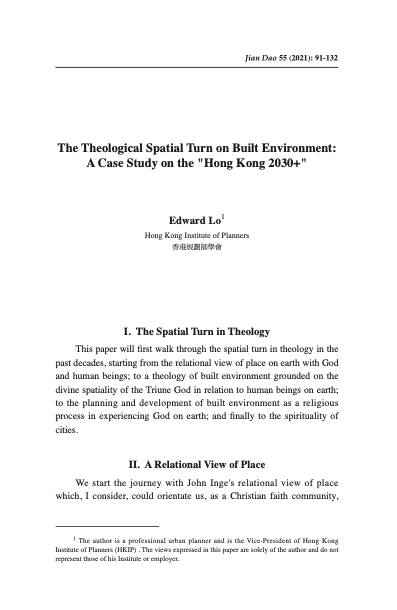The Theological Spatial Turn on Built Environment: A Case Study on the “Hong Kong 2030+” / Edward Lo
Edward Lo
ABSTRACT
This paper is inspired by the insights accumulated in the theological spatial turn on built environment in the past decades in particular the visions and concepts to be pursued in the planning and development process of our built environment with a view to striving for a genuine human flourishing and life-enhancing built environment in God’s image. This theological turn is practically oriented and proclaims a critical review and a paradigm shift of the planning and development process of our built environment, ultimately demanding for priority consideration on humanistic concerns rather than on maximization for economic returns and efficiency. A working framework is formulated by making reference to the key visions and concepts as expounded in this theological spatial turn for guiding the planning and development of human flourishing and life enhancing built environment.
Hong Kong is spearheading her longer-term landuse planning in meeting the challenges ahead with the promulgation of the vision driven, pragmatic, action-oriented “Hong Kong 2030+: Towards a Planning Vision and Strategy Transcending 2030” (the “Hong Kong 2030+”) serving as a strategic blueprint for the long-term sustainable development of Hong Kong. This last part of this paper will first demonstrate that some planning visions and recommendations under the “Hong Kong 2030+” coincidentally echo with some key visions and concepts expounded in the theological spatial turn of built environment. This paper argues that in respecting the givenness of the “Hong Kong 2030+” to be Hong Kong’s strategic planning blueprint, our proactive participation in Hong Kong’s planning and development process to advocate the faithful and timely implementation of such visions and recommendations could be an expedient and effective way in facilitating the earlier arrival of a genuine human flourishing and lifegiving Hong Kong built environment.
撮要
本文先行探討當代神學轉向城市空間的議題,思考如何構建合乎上帝形象 並為社會羣體帶來真實豐盛生命的城市環境,及在規劃發展我們的城市時更應倡議的願景及概念。最終這進路批判了現行城市規劃及發展的理念及過程—只著重經濟發展効益及最大回報,因而需作思維轉換,轉移至優先關注人性需要。
香 港 發 表 了《 香 港 2030+:跨越 2030 年 的 規 劃 遠 景 與 策 略 》(《 香 港 2030+》)作為香港持續發展的策略性長遠規劃藍圖。本文第二部分展示《香港 2030+》其部分建議,大致符合當代神學在城市空間思考所倡議的願景及概念;本文同時指出在既定的《香港 2030+》策略性規劃藍圖的框架下,我們透過積極參與規劃及發展過程倡導落實這些建議,可以是權宜及有效的實際策略,為香港社會羣體帶來上述豐盛生命的城市環境。
原載於《建道學刊》55期(2021年1月),頁 91-132。
Latest Articles
新手牧者研究計劃(三):新手牧者的身心靈狀態 / 盧慧儀
2025 年 11 月 19 日
個體與關係:滕近輝思想中「深化」的靈性觀 / 倪步曉
2025 年 11 月 18 日
香港九龍塘基督教中華宣道會之起源和發展史/陳智衡
2025 年 10 月 20 日
Highlights
[電子書]困境與抉擇:「建道研究中心30週年誌慶」跨學科研討會論文集/廖炳堂、倪步曉主編
2025 年 1 月 2 日
從梧州到長洲:建道神學院125年的挑戰與恩典 / 陳智衡
2023 年 10 月 1 日
微小教會的見證/高銘謙
2023 年 6 月 1 日







